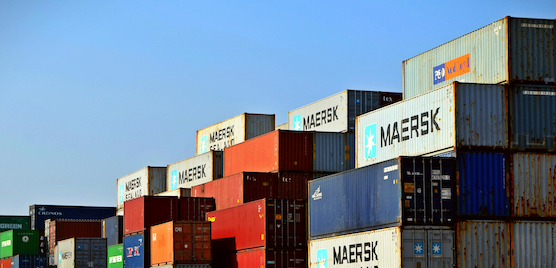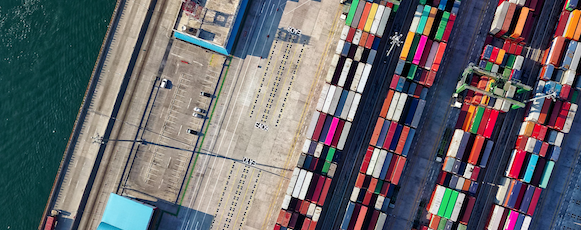02/12/2024
Smart logistics: How cloud and IoT are driving the future of supply chains
Right now, the logistics sector is a powerhouse, fuelling our economy with a whopping £185 billion each year and creating jobs for about 8% of the UK workforce. That's over 214,000 businesses working together to keep things moving, from local deliveries to major exports, with trade volumes now topping £1 trillion annually.
What’s really kicking things up a gear is the tech revolution. Last year’s introduction of the Electronic Trade Documents Act (ETDA) was a game-changer, officially giving digital documents the green light. Now, logistics firms can ditch the paperwork, cut down on delays, and really focus on making things faster, smoother, and more efficient with the help of automation, cloud computing, and IoT.
With more logistics companies investing in custom software, automation, and cloud-based infrastructure, we’re seeing a boost not only in productivity but also in sustainability. Experts predict these digital tools, backed by savvy policies, could add nearly £8 billion to the UK’s GDP every year by 2030. Here’s a breakdown of eight major ways that cloud, IoT, powered by bespoke software, are making waves in logistics right now.
The 8 big changes cloud and IoT are bringing to logistics

- Real-time tracking and total visibility
Cloud and IoT give industry insiders the ability to track every step of the supply chain in real-time. Smart sensors attached to vehicles, containers, or individual packages beam data on location, temperature, and other conditions straight to the cloud. This means businesses can keep a closer eye on their inventory, prevent losses, and stick to regulations. A perfect example is the pharmaceutical industry, where these tools help maintain strict temperature controls on sensitive medicines—avoiding spoilage and ensuring products are safe.
- Smoother inventory management
Managing inventory is so much easier with cloud and IoT. Automated sensors track stock movements, reducing the need for manual counts - and the errors that come with them. Plus, cloud systems let supply chain workers check inventory status anytime, anywhere. For companies juggling complex supply chains, this means better forecasting, lower costs, and no more surprises from overstocking or running out.
- Predictive maintenance to keep downtime in check
Vehicle breakdowns can disrupt the whole delivery schedule. But with IoT sensors that monitor things like engine health and fuel levels, logistics teams can predict when maintenance is needed, avoiding surprise breakdowns. Scheduling upkeep during quieter periods keeps everything running smoothly and extends the life of equipment, which also saves money in the long run.
- Smarter route planning and lower fuel costs
Thanks to cloud-based route planning, companies can avoid traffic, choose the best routes, and reduce fuel consumption. Real-time data from IoT devices helps drivers avoid jams and take efficient routes. Plus, combining shipments in one go saves fuel, reducing both costs and the business’s carbon footprint.
- Better demand forecasting
IoT and cloud analytics let companies take demand forecasting to the next level. By crunching past data and identifying trends, algorithms predict seasonal changes and even spot new opportunities. For example, retailers can track real-time sales and stock levels to keep shelves stocked without over-ordering. The result? Lower excess stock, fewer stockouts, and happier customers.
- Seamless collaboration across the supply chain
In traditional supply chains, info can get siloed, slowing things down. With cloud tech, suppliers, distributors, and retailers can share real-time data. Suppliers, for instance, can update manufacturers on raw material status, helping with production planning. This level of transparency keeps the whole supply chain running like clockwork.
- Improved customer experience
Customers love to know where their orders are and when they’ll arrive, and cloud and IoT make this super easy. Real-time tracking updates boost confidence and loyalty, and companies can even personalise offers based on customer preferences. Retailers, for instance, can use IoT data to tailor marketing, which keeps customers coming back.
- Beefed-up security
With so many digital threats out there, security is key. Cloud platforms come with advanced security measures like encryption and multi-factor authentication, while IoT devices can monitor storage areas in real-time. Smart locks, cameras, and other tools keep goods safe from theft and ensure data stays protected.
David Ritchie, the co-founder of Propel Tech, which works closely with businesses in the supply chain sector to deliver bespoke software solutions, says:
“We are seeing cloud and IoT significantly reshaping logistics, driving efficiency, and building strong customer relationships. For companies that want to stay ahead, embracing these technologies isn’t just an option—it’s essential.
“The future of logistics is all about marrying smart tech with bespoke software. Unlike one-size-fits-all solutions, custom software is designed specifically for a business’s needs. It brings IoT devices and cloud platforms together smoothly, making it easier to collect, analyse, and act on data in real-time.”

Maximising visibility, efficiency, and security
Visibility - In logistics, where visibility and efficiency are paramount, custom software optimises IoT-enabled tracking and monitoring by connecting disparate data points—such as vehicle locations, shipment conditions, and inventory levels—into a unified dashboard. This setup provides decision-makers with instant access to accurate, actionable insights, reducing delays and preventing costly issues.
Efficiency - Bespoke solutions enhance cloud efficiency by managing data flows, automating routine tasks, and facilitating predictive analytics. Custom applications can process IoT data in real-time to forecast demand, optimise inventory, and schedule maintenance only when needed, which reduces downtime and boosts operational efficiency.
Security - Bespoke software can include advanced security protocols specific to a company’s requirements, ensuring safe data transfer across cloud systems and IoT networks. Ultimately, tailored software maximises the value of cloud and IoT investments, driving greater agility, cost savings, and customer satisfaction across the logistics and supply chain sectors.
Read Propel Tech’s case studies to discover how its industry-leading developers bring possibilities to life for businesses with bespoke software solutions.
